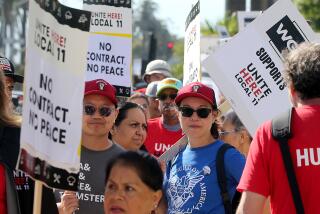Union to Step Up Boycott of Disneyland Hotel
Union officials said Tuesday that they plan to step up their boycott against the Disneyland Hotel by contacting travel agents and their customers and by staging more demonstrations.
David L. Shultz, president of the Hotel Employees and Restaurant Employees union, said he hopes the boycott, which recently won AFL-CIO approval, will hurt the hotel without “seriously damaging” it in the long run.
About 1,200 hotel kitchen workers, maids, bartenders and cooks represented by the union have worked without a contract since Feb. 28. The boycott is an effort to force management back to the bargaining table, Schultz said.
“It may be that they mistake our continuing to work at the hotel without a strike as a sign of weakness,” Schultz added.
However, Ric Morris, Disneyland Hotel spokesman, said the six-week-old boycott has caused “no economic hardship at all.”
h Deductions to Cease
In fact, he said, the hotel’s decision to stop deducting about $15,000 a month in union dues from employees’ paychecks as of April 1 could hurt the union financially.
But Bill Granfield, the union’s Orange County area coordinator, said: “All it means is that the people, individual workers, will have to pay directly to the union. We won’t lose anything.”
In the stepped-up boycott, the union will notify national travel agents by mail of the labor dispute, in an effort to gain support and force guest cancellations, Schultz said. The union also will ask major customers who already have booked conventions and meetings to support the boycott, he added.
So far, the International Assn. of Machinists and Aerospace Workers has canceled reservations for 100 rooms for 30 nights in October. Meanwhile, the Bricklayers Local 22 has canceled a three-day seminar scheduled in May.
Cesar Chavez to Appear
More demonstrations are planned, union officials said, including a rally next Wednesday that will feature an appearance by Cesar Chavez, United Farm Workers president.
But Morris said the cancellations will have little, if any, effect. When the boycott was announced, he said, the hotel assessed its future booking schedule and began selling rooms reserved for labor and pro-labor groups such as the machinists association.
“We took the position that if a labor dispute arose, most unions wouldn’t want to use our facilities. We started selling those rooms, prior to us getting the cancellations. So this won’t cause any economic hardship at all,” Morris added.
As for the visit by Chavez, one of the country’s foremost Mexican-American leaders, Morris said: “Most of the hotel’s employees don’t even know who he is, and frankly, the appearance won’t be that effective.”
Morris contended that Chavez was appearing to repay a favor from hotel bartenders, who once refused to sell wine made from grapes that were picked by non-union labor.
Demonstrations Began March 1
However, union officials said Chavez’s appearance would be significant for the Spanish-speaking employees, who make up most of the hotel’s kitchen and housekeeping staff.
Union members began demonstrating March 1 after turning down a four-year contract offer that called for wage increases averaging about 28.5% over the life of the contract.
The hotel offer included no increases for food-service employees and raises of up to 30 cents an hour for other employees. Top hourly wages are $3.90 for waitresses and busboys, $4.90 for maids and more than $6 for cooks. The union is asking for raises ranging from 30 to 60 cents an hour.
Shultz said the hotel wants to return to the “dark ages” by increasing each maid’s workload from 12 to 14 rooms per day in return for a 4% pay raise.
“They’ve already implemented this,” he said. “It’s making these mainly Spanish-speaking people work eight straight hours without a break for lunch or even a brief rest.”
Morris said that if the union requests a meeting, the hotel is “obligated to talk. But we see no change in our position.”
More to Read
Sign up for Essential California
The most important California stories and recommendations in your inbox every morning.
You may occasionally receive promotional content from the Los Angeles Times.









